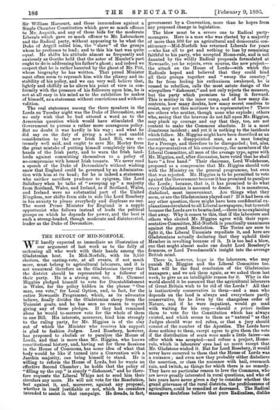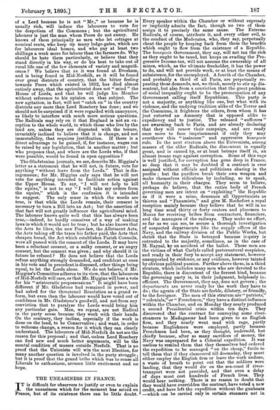THE REVOLT OF MID-NORFOLK.
WE hardly expected so immediate an illustration of our argument of last week as to the folly of reckoning all who work with their hands among the Gladstonian host. In Mid-Norfolk, with its 9,560 electors, the casting-vote, at all events, if not much more, must belong to agricultural labourers, and it is not unnatural therefore on the Gladstonian theory that the district should be represented by a follower of their party. He is a strong one, too. Mr. Clement Higgins pledged himself to vote for Disestablishment in Wales, for the policy hidden in the phrase "One man, one vote," for Local Option, and, in fact, for the entire Newcastle Programme, which, as its advocates believe, finally divides the Gladstonian sheep from the Unionist goats, and he has seen no reason to repent giving any of these pledges. If they had remained alone he would to-morrow vote for the whole of them in one Bill. His interests, moreover, bind him strongly to the ruling party, for Mr. Higgins is of the clay out of which the Minister who receives his support is glad to fashion Judges. Lord Rosebery, however, has proposed to abolish or to paralyse the House of Lords, and that is more than Mr. Higgins, who knows constitutional history, and, having sat for three Sessions in the House of Commons, has some idea of what that body would be like if turned into a Convention with a Jacobin majority, can bring himself to stand. He is willing to reform the House of Lords, but he wants an effective Second Chamber ; he holds that the policy of "filling up the cup" is simply "dishonest," and he there- fore requests the Liberal Whips not to send him their circulars any more. He will not vote for the Resolution, but against it, and, moreover, against any proposal, w. hether in itself justifiable or not, which he considers intended to assist in that campaign. He dreads, in fact, government by a Convention, more than he hopes from any proposed change in legislation.
The blow must be a severe one to Radical party. managers. Here is a man who was elected by a majority of more than 500 for an agricultural and democratic con- stituency—Mid-Norfolk has returned Liberals for years —who has all to get and nothing to lose by remaining faithful to his party, who accepted Home-rule, and is not daunted by the wildly Radical proposals formulated at Newcastle, yet he rejects, even spurns, the new project— the attack on the House of Lords—with which the Radicals hoped and believed that they could bind all their groups together and "sweep the country." So far from feeling his enthusiasm awakened, he is roused to rebellion, calls the most astute design of the wirepullers "dishonest," and not only rejects the measure, but the party which promises to bring it forward. This is mutiny in the inner camp, and of how many dis- contents, how many doubts, how many secret resolves to resist, may not this mutineer be a representative ? There are others who mutter, though none who explode ; others who, seeing that the heavens do not fall upon Mr. Higgins, may pluck up courage and say that they, too, are not content to make the Commons absolute. It is a most disastrous incident ; and yet it is nothing to the incidents which follow. Mr. Higgins might have been described as an eccentric, as a disappointed man, as a man longing for a Peerage, and therefore to be disregarded ; but, alas, the representatives of his constituency, the members of the Liberal Committee, all men of the average type, agree with Mr. Higgins, and, after discussion, have voted that he shall have "a free hand." Their chairman, Lord Wodehouse, proposed as a compromise that Mr. Higgins should vote with the Ministry on the general programme, but even that was rejected. Mr. Higgins is to be permitted to vote against the Government because it has promised to paralyse the Lords ; because, that is, it has promised to do what every Gladstonian is assumed to desire. It is monstrous, diabolical, most inconvenient. Are things what they seem, or are the Gladstonians played out? If it had been on any other question, there might have been confidential ex- planations circulated to all Liberal newspapers; but to revolt because the Lords are to be attacked,—there is no explaining that away. Why it comes to this, that if the labourers and others who elected Mr. Higgins agree with their repre- sentative Committee, Mid-Norfolk is practically unanimous against the grand Resolution. The Tories are sure to fight it, the Liberal Unionists repudiate it, and here are Gladstonians actually declaring that they uphold their Member in revolting because of it. It is too bad a blow, one that might almost make one doubt Lord Rosebery's firmness, or Lord Tweed mouth's insight into the average British mind.
There is, however, hope in the labourers, who may punish Mr. Higgins and the Liberal Committee too. That will be the final conclusion of the Gladstonian managers ; and we ask them again, as we asked them last week, to give us an intelligible reason for it. Why in the world should it be assumed that the agricultural labourers of Great Britain wish to be rid of the Lords ? All that is instinctively conservative iu them—and a man who depends on the land is always and everywhere partly conservative, for he lives by the changeless order of Nature, and if he were impatient, would go mad with waiting for his crop— should a priori incline them to vote for the Constitution which has always existed, and which seems to them as " natural " as that Judges should wear red robes, or that a jury should consist of the number of the Apostles. The Lords have done nothing to them, except agree to give them the vote if the distribution of seats were made a little fairer—an offer which was accepted—and refuse a project, Home- rule, which in labourers' eyes had no merit except that Mr. Gladstone wished it. But for Lord Rosebery, it would never have occurred to them that the House of Lords was a nuisance ; and even now they probably either disbelieve the assertion, or class the nuisance with hail, overmuch rain, and twitch, as things for which there is no remedy. They have no particular reason to love the Commons, who are never greatly interested in rural questions, and who of late years have never given a day to consider whether the grand grievance of the rural districts, theof agriculture, could be remedied or decreased. The Radical managers doubtless believe that pure Radicalism, dislike of a Lord because he is not "Mr.," or because he is usually rich, will induce the labourers to vote for the despotism of the Commons ; but the agricultural labourer is just the man whom Peers do not annoy. He knows of them principally as men who let cottages at nominal rents, who keep up many lodge-gates, which are for labourers ideal homes, and who pay at least two shillings a week more for labour than the farmers do. Why should he hate them particularly, or believe that they stand directly in his way, or do his best to take out of rural life one of the few elements of variety and magnifi- cence ? We believe that as it was found at Evesham, and is being found in Mid-Norfolk, so it will be found over great districts of country, that the bitter feeling towards Peers which existed in 1832, has died almost entirely away, that the agriculturist does not " mind " the House of Lords, and that he will judge his Member without reference to his opinion on that subject. The new agitation, in fact, will not "catch on" in the country districts any more than Lord Rosebery has done; and we should not be surprised if it were regarded with annoyance, as likely to interfere with much more serious questions. The Radicals may rely on it that England is not an ex- ception to the whole world, in which those who live by the land are, unless they are disgusted with the tenure, invariably inclined to believe that it is change, and not immutability, that requires justification. If there is a direct advantage to be gained, if, for instance, wages can be raised by any legislation, that is another matter ; but who proposes that, and where are the Lords who, if that were possible, would be found in open opposition ?
The Gladstonian journals, we see, describe Mr. Higgins's letter as a statement that he will not, in future, vote for anything "without leave from the Lords." That is dis- ingenuous; for Mr. Higgins only says that he will not vote for anything intended to facilitate action against the Upper House. To say, "I will not help to kill the squire," is not to say "I will take my orders from the squire," which is the confusion it is intended to suggest. The only sense in which the words are true, is that while the Lords remain, their consent is necessary to turn a Bill into an Act ; but the assertion of that fact will not greatly influence the agricultural mind. The labourer knows quite well that this has always been true,—indeed, he hardly conceives of a way of making laws in which it would not be true ; but he also knows that the Acts he likes, the new Poor-law, the Allotment Acts, the Acts taking off the taxes his father paid, the Acts that cheapen bread, the Act which establishes Parish Councils, were all passed with the consent of the Lords. It may have been a reluctant consent, or a sulky consent, or an angry consent, but the consent was given ; and why should it in future be refused ? He does not believe that the Lords refuse anything strongly demanded, and confident at once in his vote and in precedent is disposed, other things being equal, to let the Lords alone. We do not believe, if Mr. Higgins's Committee adheres to its view, that the labourers of Mid-Norfolk will care, or that Mr. Higgins will lose a vote for his "aristocratic prepossessions." It might have been different if Mr. Gladstone had remained in power, and bad asked for the threatened Resolution as a grand re- form, but even then the labourer would have voted out of confidence in Mr. Gladstone's goodwill, and not from any conviction that to paralyse the Lords would bring him any particular gain. Men, we repeat, are not Radical in the party sense because they work with their hands. On the contrary, they incline, especially if the work is done on the land, to be Conservative ; and want, in order to welcome change, a reason for it which they can clearly understand. The labourers of Mid-Norfolk do not see the reason for this proposal ; and that, unless Lord Rosebery can find new and much better arguments, will be the mental condition of masses outside Norfolk. That is no proof that the Unionists will win the next Election, for many another question is involved in the party struggle ; but it is proof that the grand bribe which was to rouse all Liberals to enthusiasm, arouses little excitement and no hope.







































 Previous page
Previous page